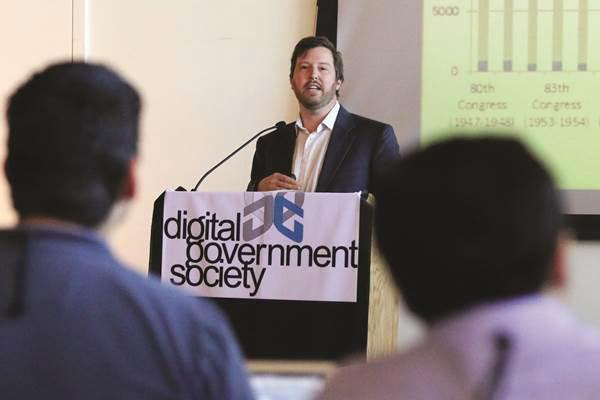
Technology’s role in tackling problems focus of ASU hosted digital government conference
Sascha Meinrath wants policymakers to know that creating community wireless data networks doesn’t have to involve paying telecommunication companies millions of dollars in equipment and costs.
He delivered that message to attendees of the 16th annual International Digital Society Conference on Digital Government Research held at the ASU Downtown campus. Hosted by the ASU School of Public Affairs, a unit of the College of Public Service and Community Solutions, the conference drew participants from throughout North America, Europe, Asia and Australia.
“We’re taught that it’s really complicated to create wireless networks because then that allows only proprietary closed-sourced, very expensive systems by the telcos (telecommunication companies) to exist,” say Meinrath. “But that is absolutely untrue.”
Meinrath is the founder of X-Lab, a technology and policy think tank based in Washington D.C. During his presentation, Meinrath showcased an alternative to industry-driven digital data networks called Commotion Wireless. He explained how his team worked with community members of a Tunisian city who had technological expertise to place a series of wireless routers on rooftops in 2013.
“We had girls as young as age eight to 12 as our source deployment team and we did it in two weekends of actual implementation work,” Meinrath says, pointing to how quickly the system was put in place. “We waste an unbelievable amount of time on plotting things out when what we should be doing is just getting out there and implementing.”
Meinrath explained the technologies involved in creating an interconnected digital system aren’t as complicated as people have been led to believe. His organization provides downloadable instructions and software to create such networks.
“If you can put up a television aerial, you can build a 21st century telecommunications infrastructure,” says Meinrath. “It’s just that simple.”
Meinrath says a huge obstacle facing the creation of low-cost community based systems is how ill- informed policymakers are about this technology. He hopes the work of those who attended the conference can help change that.
“If we harness the energy, the expertise, the information that people here have—are working on, are researching, and writing about--that that can effect policy. And that can affect change for the better a lot of the decision making happening in Washington D.C. and elsewhere.”
In addition to Meinrath, the conference featured Arizona state senator Bob Worsley, the founder of Skymall magazine. The Mesa lawmaker showcased a website he helped create called Arizona Voices or azvoices.gov. It allows some 6,000 users who are registered voters in Arizona to weigh in on proposed laws before the legislature or propose their own law. Traci Morris, director of the American Indian Policy Institute, discussed the issues facing Native American communities and technology.
The three-day conference also included numerous workshops on open government data and new data tools for researchers and policymakers.